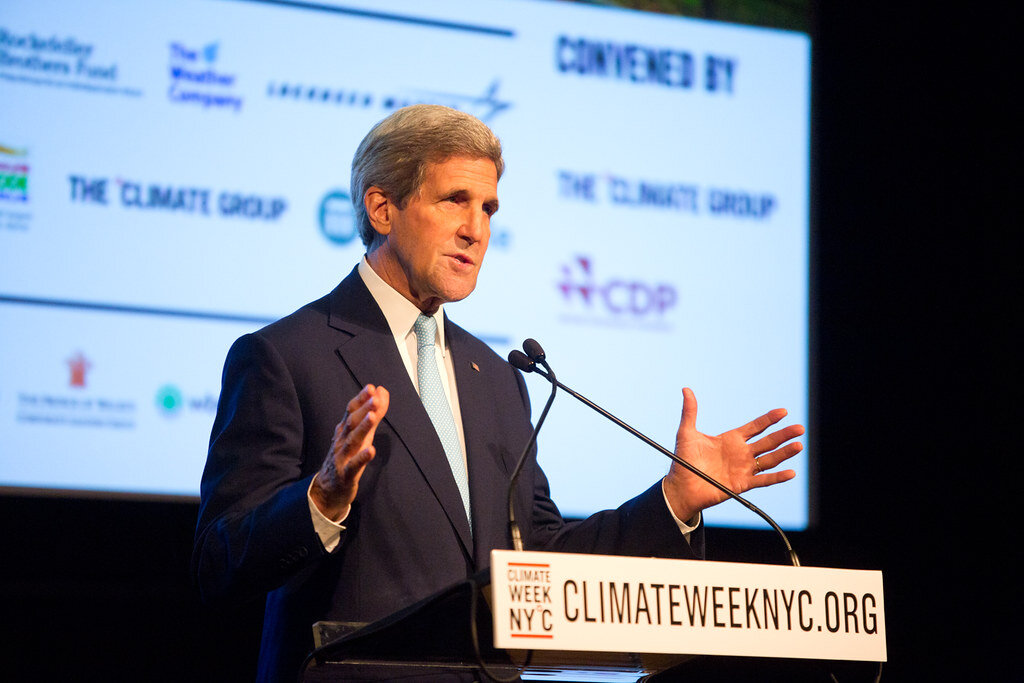Pictured above: former Secretary of State John Kerry. Photo courtesy of Flickr.
By Helen Gloege ’23
Staff Writer
President-elect Joe Biden announced on Nov. 23 that former Secretary of State John Kerry will serve as the special presidential envoy for climate, a new position created by Biden’s team. Kerry will serve as a cabinet-level appointee in the administration and will sit on the National Security Council as its first-ever official dedicated to climate change.
The term “presidential” in his title means that Kerry is likely to report directly to Biden. The term “envoy” means that Kerry is a senior diplomat and is thus responsible for representing the U.S. climate agenda in diplomatic circles, including in meetings with foreign leaders. Biden’s team has also promised to instate a domestic equivalent to Kerry, an appointment that has yet to be announced.
The appointment of Kerry to this office indicates a shift in policy and approach to climate from the last four years under the Trump administration. The position shows that Biden’s approach to climate change is a foreign policy issue because Kerry will sit on the NSC and work with international officials. Kerry will also be sent as a representative of the U.S. on climate-related issues — an unusual feature of this appointment in that most envoys normally require confirmation by the U.S. Senate.
During the Obama administration, Carol Browner, an Environmental Protection Agency administrator, served as a domestic climate policy coordinator. Browner was known for having a vast wealth of knowledge on climate change, but her pushes for action were frequently countered by Larry Summers, Obama’s chief economic advisor.
Kerry succeeded Hillary Clinton as secretary of state in 2013 and played a significant role in the development of the Paris climate accord. In 2019, Kerry co-founded a bipartisan initiative of world leaders and celebrities to combat the climate crisis dubbed World War Zero. During this past Democratic primary, he was the co-chair of the Biden-Sanders unity task force that was focused on producing recommendations on climate.
After its announcement, Kerry’s appointment received much praise. Michael Mann, the director of the Earth Science Center at Penn State, said he “cannot think of one person better qualified” for the job than Kerry. The Sierra Club’s acting Deputy Director for Policy and Advocacy Dalal Aboulhosn pointed to Kerry’s longtime advocacy on climate and decades of political experience as key positive aspects of the nomination. Former Senator Tim Wirth of Colorado, who was a climate negotiator under secretary of state for global affairs in President Bill Clinton’s administration, noted that Kerry “understands the depth of the climate issue and the need for a huge global economic transition.” Co-founder and Executive Director of the Sunrise Movement Varshini Prakash, who co-chaired Biden’s climate task force, also praised Kerry’s appointment, saying he is “committed to engaging and listening to young voices — even when we might not always agree — ensuring we have a seat at the table.” Sunrise also responded to the position, calling for a domestic counterpart to Kerry, which the Biden team responded to by saying there would be a domestic counterpart announced in the near future.
Despite many encouraging responses, not all reactions have been positive. Wenonah Hauter, the executive director of Food & Water Action, said that “Kerry has been a long-time apologist for fossil fuel fracking, and a reliable promoter of false climate solutions.” The environmental group Food & Water Action has doubted whether Biden’s vision will be fast or effective enough. Arkansas Republican Senator Tom Cotton is also critical of the appointment, saying, “John Kerry [is] thrilled at [the] prospect of returning to his dream job of living in Central European luxury hotels while negotiating deals that are bad for America.”
The position of special presidential envoy for climate could be the beginning of many climate-related positions in the Cabinet and government. For now, the creation of this post shows that tackling the climate crisis is a priority for the new executive branch. Within the upcoming weeks, it is likely we will know Kerry’s promised domestic counterpart and more details about the Biden administration’s plans to confront the climate crisis.




